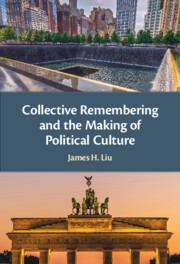Book contents
- Collective Remembering and the Making of Political Culture
- Collective Remembering and the Making of Political Culture
- Copyright page
- Contents
- Preface
- Part I Introduction to Collective Remembering
- Part II Developing a Theoretical Approach to Collective Remembering
- Chapter 4 The Organization of Collective Memory
- Chapter 5 Social Representations of World History as a Symbolic Resource: Content Informs Process in Future Making
- Chapter 6 Historiography and Human Agency
- Chapter 7 A Dialectical Approach to Collective Remembering
- Part III Idiographic Case Studies of Collective Remembering
- References
- Index
Chapter 6 - Historiography and Human Agency
Collective Memory as History, and History in Collective Remembering
from Part II - Developing a Theoretical Approach to Collective Remembering
Published online by Cambridge University Press: 04 August 2022
- Collective Remembering and the Making of Political Culture
- Collective Remembering and the Making of Political Culture
- Copyright page
- Contents
- Preface
- Part I Introduction to Collective Remembering
- Part II Developing a Theoretical Approach to Collective Remembering
- Chapter 4 The Organization of Collective Memory
- Chapter 5 Social Representations of World History as a Symbolic Resource: Content Informs Process in Future Making
- Chapter 6 Historiography and Human Agency
- Chapter 7 A Dialectical Approach to Collective Remembering
- Part III Idiographic Case Studies of Collective Remembering
- References
- Index
Summary
Collective memory has claimed a larger place in the discipline of history as historiography (the study of the writing of history) has become more advanced. In antiquity, and at the beginning of modernity, according to Iggers et al.’s (2008) panoramic Global History of Modern Historiography, historians were not so aware of the cultural and group-based components embedded in their historical writing and reasoning. As the different peoples of the world have come together, the blind spots in their own culture and their own group’s historiography have become more apparent. History has become more aware of itself as a product of historiography, a reconstruction based on culturally sanctioned premises rather than a “clean copy” of the past. In such a context, collective memory, which is clearly fallible, and obviously a cultural and group-based construct rather than an objective view of the past, becomes useful as one strand in a complex weave of knowledge and ideas that can be used to write and interpret history.
- Type
- Chapter
- Information
- Collective Remembering and the Making of Political Culture , pp. 117 - 138Publisher: Cambridge University PressPrint publication year: 2022



